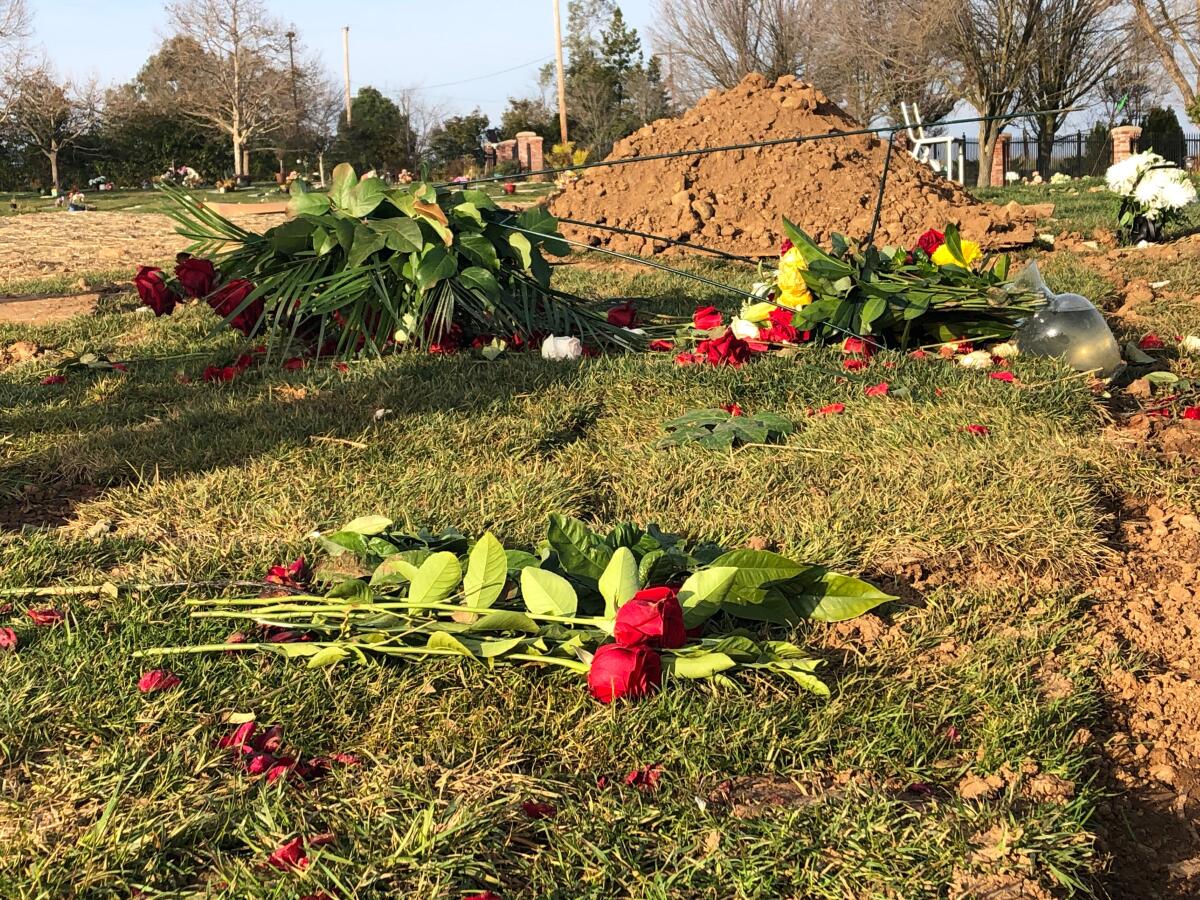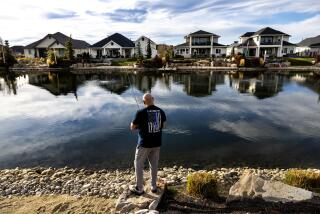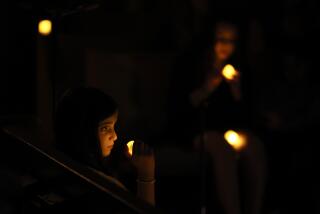Defense contractor from California whose death sparked U.S.-Iran conflict is mourned

SACRAMENTO — They washed the man’s body with care, wrapping him in a plain white cloth before bringing him to the prayer hall where community members waited.
Most of the men and women gathered Saturday afternoon at the Greater Sacramento Muslim Cemetery to honor Nawres Waleed Hamid hadn’t known him, but they felt compelled to pay him respect.
A U.S. defense contractor in Iraq, Hamid was killed in December in a strike on an Iraqi military base where he worked as a linguist. His violent death triggered an escalation in the geopolitical struggle between Iran and the United States, belying the quiet life that he led at home in Sacramento and a temperament marked by gentleness.
The United States blamed Kataib Hezbollah, a paramilitary faction backed by Iran, for the attack that killed Hamid. U.S. forces responded by striking multiple positions of the group, killing some 25 people and wounding 51 others.
Two days later, thousands of protesters aligned with an Iraqi paramilitary group stormed the compound of the U.S. Embassy in Baghdad. Angered by that outburst, President Trump ordered a drone attack that killed Gen. Qassem Suleimani, the powerful and shadowy head of Iran’s elite Quds Force, shortly after he’d arrived at the Baghdad airport Friday.
Hamid’s death was cited as one of the reasons for the fiery U.S. response targeting the general — which in turn prompted Iran on Tuesday to launch a missile strike against two military bases in Iraq where U.S. troops are stationed.
But despite the politics surrounding the attack that killed him, the nature of Hamid’s death was not mentioned during the ceremony.
“Someone dies and there’s no such thing as a political discussion,” said Sajad Janmohamed, the manager of the cemetery. “You do your duty to your fellow Muslim.”
News of Hamid’s funeral spread through Sacramento’s Muslim community Friday, the day his body was finally returned home. More people received word of his death via WhatsApp. He was buried the next day, in line with the Muslim tradition that requires funerals to be held as quickly as possible.
Mourners assembled inside the prayer hall at the rural cemetery in front of an archway of royal blue tiles, hand-engraved with Quranic verses honoring the dead, citing a traditional prayer: “We are from him. To him we return.”
About 50 people stood alongside Hamid’s wife as they lowered him into his final resting place, where he lay facing toward Mecca.
His two boys, ages 2 and 8, were absent.
A few details about Hamid’s career path to becoming an interpreter, and his service to the U.S. military, could be gleaned from online sources.
A photo posted online by the Los Rios Community College District shows Hamid in 2015 as an American River College student. The photo is from a newsletter about the school, where Hamid reportedly was a student for five years, studying computer science. His Facebook page says that he graduated with a degree in computer sciences in 2017.
Hamid’s employer, Virginia-based Valiant Integrated Services, paid for the funeral. The company offers a range of international services, including interpretation, according to its website.
“We are deeply saddened by the tragic death of Nawres Hamid,” Valiant said in a statement Tuesday. “Mr. Hamid was a consummate professional and highly committed member of the Valiant team who was cherished and valued by his colleagues.”
In a statement, U.S. Rep. Doris Matsui (D-Sacramento) said she was heartbroken over news of Hamid’s death.
“Our U.S. military has relied on the expertise and professionalism of linguists in almost every mission around the globe, especially in Iraq,” she said. “Nawres served and sacrificed for our nation, and we all owe him a debt of gratitude. My thoughts and prayers are with Nawres’ widow and children at this time.”
Hamid’s family belongs to a growing community of Iraqi immigrants in Sacramento and across California. Hamid’s widow told the Sacramento Bee that they came to the U.S. in 2011, when she was pregnant with their eldest son.
More than 10,000 Iraqi refugees settled in the state during the eight-year period from 2008 to 2016, the majority of them in Sacramento and San Diego. But the migration rate has slowed as the Trump administration tightened its restrictions on refugee admissions.
Just 99 Iraqi refugees were settled in California in the 2018 fiscal year, compared with 1,280 in fiscal 2017, according to figures from the Refugee Processing Center. Of those 99, 83 moved to the U.S. on special immigrant visas earned for service to U.S. military and government forces abroad.
“Certainly some Iraqis in Northern California came through because of being in peril after helping U.S. forces, but that’s only part of a much larger Iraqi community,” said Karen Ferguson, executive director of the International Rescue Committee in Northern California.
“The Iraqi community is a diverse community where some came for employment opportunities, others came through family reunification as immigrants and some were coming through as refugees,” she added.
It was not immediately clear whether Hamid and his wife moved to the U.S. on a special immigrant visa or through another pathway for Iraqis who have helped the American military, such as the P-2 Direct Access Program that allows people to apply for refugee resettlement in the United States through the U.S. Refugee Admissions Program.
Hamid lived with his family in Arden Arcade, in an apartment complex of about 130 units congregated around a central courtyard.
When a reporter visited Wednesday, the sounds of small children and foreign-language television echoed through the building’s narrow halls with peeling gray carpet. Hamid’s widow declined to speak with The Times, saying she did not want to talk about her recent loss.
Many of the single-bedroom apartments are rented to families that came to the U.S. on special visas.
“This building, we all came that way,” said Hamid Tahiry, who lived across the hall from Hamid’s family, and has also worked with U.S. troops in Afghanistan.
The families were settled in the area with the help of refugee organizations, in part because the rent there is cheap. Many said they hoped to move as quickly as possible, but Hamid’s family has been here for years, living in at least three different units.
Hamid “was a good, kind person. He was always with his family,” Tahiry said.
A downstairs neighbor who asked to be identified only by his first name, Robert, said he had known Hamid for years and considered him to be a good friend. The two would sometimes sit together in the courtyard, he said.
He recalled Hamid telling him that his name meant sea gull in Arabic and that his father had chosen it because he loved the water. Robert said it became a joke with an upstairs neighbor whose name translated to “knight in shining armor,” a grander moniker.
“He was really cool,” Robert said, adding that his friend’s death was “perplexing and shocking.”
When he heard about Hamid’s death, Robert said, he had been told the man was killed on the job.
But he had not known that his friend was overseas, and he had not connected the national news about mounting tension in the Middle East to the gentle and polite man who would remind him to get a jacket when it was too cold to sit outside and chat without one.
“It’s a small world,” Robert said, “the interconnectedness.”
As the disparate facts collided, hurt and confusion clouded his face.
More to Read
Sign up for Essential California
The most important California stories and recommendations in your inbox every morning.
You may occasionally receive promotional content from the Los Angeles Times.













